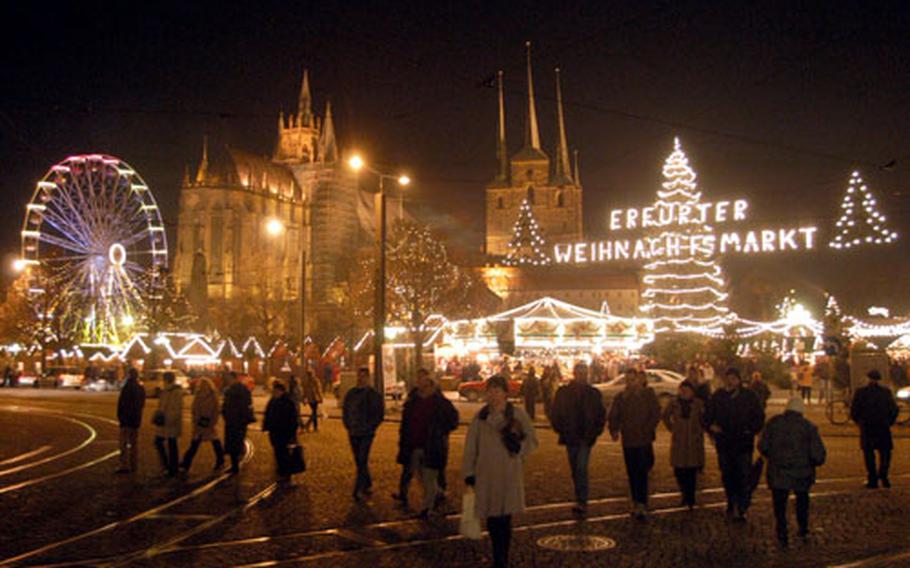
The Erfurt market on the Domplatz, with the Mariendom (cathedral) and the St. Severus church serving as luminous backdrops. (Michael Abrams / S&S file photo)
Some say the Christmas market tradition originated in Germany, as an outgrowth of winter markets where the townspeople would stock up on provisions for the winter. Whether or not this can be proven, one thing is for certain: The Germans are experts at creating Christmas magic.
We took a stroll through three of the major German markets that put on an annual show of delightful things to smell, see and taste. Go to buy or to stroll, but above all go to experience one of the things Germany does so well.
Erfurt
This is only the 154th Christmas market in Erfurt in eastern Germany, but with its location, you would believe it to be much older. Located on the Domplatz, with the city’s cathedral and the St. Severin church towering over it, there couldn’t be a more dramatic setting. At the foot of the Domberg (cathedral hill) about 200 stands offer food, drink and merchandise. An 80-foot Christmas tree welcomes visitors to the market, and a Ferris wheel offers a great view of the market and city.
Here you can sip Glühwein, the hot mulled wine offered at every Christmas market, and eat Thüringer Rostbratwurst, a trademarked, long, thin brat from the German state of Thuringia, of which Erfurt is the capital. A real one is prepared only on a charcoal grill, and must be made in Thuringia. In other parts of Germany you may find “nach Thüringer Art,” which means it is made like a Thüringer, but not actually from Thuringia.
Erfurt is also a good place to buy traditional Christmas decorations from eastern Germany, such as nutcrackers, smokers, tree ornaments and the Christmas pyramids that spin from the heat of candles.
Heidelberg
Speaking of pyramids, this year the Christmas market in Heidelberg will feature a giant one, more than 30 feet in diameter, decorated with figures from the town’s history.
Heidelberg’s market is spread throughout the old town, but is on three principal squares, the Marktplatz, Universitätsplatz and the Kornmarkt.
The Kornmarkt, with the city’s famed castle towering above, is the spot for families. Among the stands selling food, drink and presents are rides for children and a Nativity scene with stables where the kids can pet the animals.
Basket weavers, woodcarvers and goldsmiths practice their trade here — and sell their finished products.
The giant pyramid is on the Marktplatz (market square), along with plenty of stands offering food and drink. St. Nick is also present, waiting to get his picture taken with all the kids, naughty or nice.
The heart of the Heidelberg market is at Universitätsplatz. Between the food stands, many artists offer their works: hand-painted silk scarves, hand-blown glass tree ornaments, paintings, photographs, hand-fashioned leather belts and clothing, and fresh-smelling soaps and perfumes.
The children — at least those not spoiled by modern computer games — will enjoy a ride on the old-fashioned merry-go-round that leisurely spins here.
Frankfurt
Although Frankfurt, with its skyline of skyscrapers is a thoroughly modern city, there is something thoroughly old-fashioned about its Christmas market.
Maybe it is because it dates to, at least, 1393. Or maybe it is the setting on the Römerberg, between the old city hall (Römer) and the reconstructed medieval half-timbered houses, that the market — despite often being overcrowded — has a cozy, old-time feeling.
For generations, Frankfurters have come here to buy Christmas presents. Today it is still a good place to buy wooden toys and Christmas decorations. Once a very local affair, the market has become the very international meeting place that the city itself has become. While the omnipresent Glühwein is sipped here, this is Frankfurt after all, and the local specialty, hot apple wine is also offered. Cold, how you normally drink it, is an acquired taste for some, but hot apple wine, served here to fight off Jack Frost, is even more so.
Another specialty of the Frankfurt market are Bethmaennchen, marzipan-filled biscuit figures, sort of like gingerbread men.
In Frankfurt, as in Heidelberg and Erfurt, Christmas carols waft through the air, played by local choirs and bands. Children cry with glee as they spin about on the rides, or more likely, because they have found that toy that has caught their fancy. The smell of Glühwein, wurst and roasted chestnuts fill the air.
Suddenly the spirit of the season grabs you, and the winter blues are gone.
If you go ...
The Christmas markets in Erfurt, Heidelberg and Frankfurt, Germany, all run through Dec. 22.
• The Erfurt market, starts Friday. Hours are 10 a.m. to 8 p.m. Sunday through Thursday and 10 a.m. to 9 p.m. Fridays and Saturdays.
• Heidelberg’s market is under way, and open from 11 a.m. to 9 p.m. daily.
• The Frankfurt market is under way and open from 10 a.m. to 9 p.m. weekdays and 11 a.m. to 9 p.m. Sundays.
— Michael Abrams